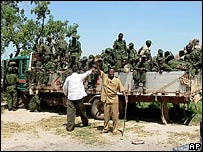
The papers this morning reported the death of Saddam Hussein, executed this morning by hanging at a secure facility in northern Baghdad for crimes against humanity. He was executed over the killings of 148 Shias from the town of Dujail in the 1980s.
The discussion in all the papers and online is - was it the right thing to do? Well certainly not according to the public that have commented on the BBC's website.
Here's a flavour of the first few pages - it was hard to find anything positive - inappropriate to execute Saddam on Eid, Saddam wasn't the only sinner in his acts, a barbaric act, disgusting act of depravity, his death will make little or no difference for the poor people of Iraq, against democratic norms and values, immoral, disgusted and ashamed, trial was extremely unfair, primitive, iraq was more secure under Saddam than under Mr Bush's occupation, A dictator created then destroyed by America, hasty and harsh, Saddam was hung a powerless old man, childish and revengeful action by Mr. Bush, murder of the legitimate Iraqi president
Some other people put the following comments that we should all consider
- Remember the families & victims who suffered under his rule
- Execution is a good lesson for those who continue to despise their own people
- Tyrant dictators across the world will sleep less easily tonight
The British public can go on about the hypocrisy of our governments, and that of the US, because they make and then break dictators, they sell arms, they take sides, they ignore conflicts and suffering when it suits and at other times moralise and interfere in the name of democracy and humanity. They will continue to do all this - nothing will change! But the British public should also watch itself - so many of the comments put online are hypocritical - they would be singing a different tune if Saddam were still in power and repressing his people. They would be calling for his removal, they would be saying the country had a right to try him how it saw fit, they would be calling for justice - and when it is delivered, albeit brutally, they complain!
And what about those that suffered - as said above i'm sure many will be relieved and feel that they have had some justice. Why do we think we have it right because we don't have the death penalty? We are so patronising and condesending to the Iraqi's about choosing this sentance for him - we call them puppets, unfair, barbaric, murderers - the poor people! They just don't seem to get anything right do they. They try their former leader, which is quite remarkable in their history to have such a trial, and yet they get criticised. If they had put him in prison they would have got criticised! If they kick the west out, they are punished, if they stay they are punished.
Whether we agree with the death penalty or not, we should all do one thing. Governments will never get everything right, in fact they get a lot wrong and actively do a lot wrong.Yet when they make a decision to rid the world of a ruthless dictator, tyrant and murderer, perhaps for once we should just respect and accept their decision.

